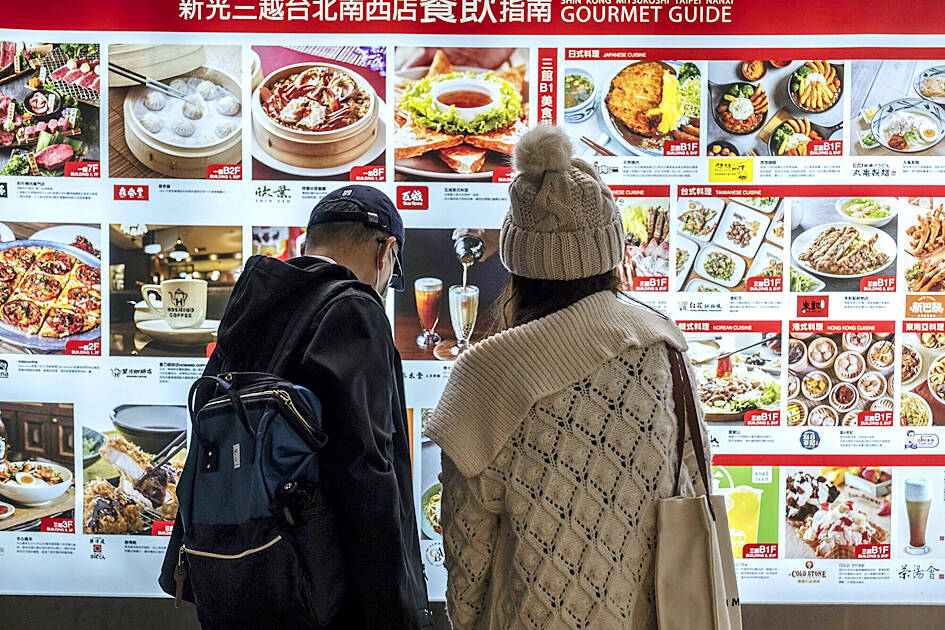Major restaurant chains in Taiwan last week reported hefty increases in revenue for last year on the back of strong dining demand, saying there are signs that the momentum is gaining traction ahead of the Lunar New Year holiday.
Wowprime Corp (王品集團), which operate Wang Steak (王品台塑牛排), Tasty (西堤), Tokiya (陶板屋), Chamoinx (夏慕尼) and other restaurant brands, on Wednesday reported that combined revenue last year soared 21.6 percent to NT$22.23 billion (US$714.12 million), making it the revenue leader among its peers.
Reservations for the Lunar New Year holiday already amount to about 70 to 80 percent of its total capacity, as dining demand remains strong, Wowprime said.

Photo: Lam Yik Fei, Bloomberg
Company revenue this quarter is forecast to increase 18 percent quarterly or 15 percent annually, and revenue and profit this year are likely to grow by double digit percentages from last year, Yuanta Securities Investment Consulting Co (元大投顧) said in a research note on Thursday.
However, unfavorable factors such as rising labor costs in Taiwan and weakening demand from China are potential risks to the company’s operations this year, Yuanta said.
Dumpling restaurant chain Bafang Yunji International Co (八方雲集) reported that last year’s revenue increased 7.9 percent to NT$7.34 billion from the previous year.
Bafang Yunji attributed the business improvement to the opening of new outlets in Hong Kong and the US, as well as the renovation of old outlets in Taiwan, which helped it win new customers.
Yuanta said it expects the company’s revenue this quarter to be flat from last quarter, or grow 11 percent from a year earlier.
As the company aims to raise the contribution from its US operations to 10 percent of its total revenue this year, up from about 4 percent last year, it could help boost earnings growth due to a higher gross margin in the US market compared with Taiwan’s and Hong Kong’s, Yuanta said.
TTFB Co Ltd (瓦城泰統集團), which owns Thai Town Cuisine (瓦城泰式料理), Very Thai Restaurant (非常泰), 1010 Hunan Cuisine (1010湘), Very Thai Noodles (大心新泰式麵食), Ten Ten Hunan Bistro (十食湘) and Shann Rice Bar (時時香), posted a 26.1 percent annual increase in revenue to NT$5.72 billion, thanks to robust dining demand and outlet expansions.
It reported a bright outlook, as Taiwanese organize gastronomic reunions over the Lunar New Year holiday.
Yuanta said that TTFB revenue this quarter would likely increase by 10 percent from last quarter.
However, it would still face a labor shortage and rising labor costs, which have been increasing since the third quarter of last year, Yuanta said.
Hi-Lai Foods Co (漢來美食), which operates buffet restaurant Hilai Restaurant (漢來海港餐廳), Hi-Lai Vegetarian Restaurant (漢來蔬食) and luxury Chinese restaurant Celebrity Cuisine (名人坊), posted NT$4.91 billion in revenue last year, a 30.9 percent increase from a year earlier.
The Kaohsiung-based company said its popular Hilai buffet restaurants have been fully booked over the entire seven-day Lunar New Year holiday.
Its new Island (島嶼) buffet restaurant in Taipei’s Nangang District (南港) is also fully booked for next month, it said, adding that it expects the luxury outlet to generate NT$42 million in revenue.

Intel Corp chief executive officer Lip-Bu Tan (陳立武) is expected to meet with Taiwanese suppliers next month in conjunction with the opening of the Computex Taipei trade show, supply chain sources said on Monday. The visit, the first for Tan to Taiwan since assuming his new post last month, would be aimed at enhancing Intel’s ties with suppliers in Taiwan as he attempts to help turn around the struggling US chipmaker, the sources said. Tan is to hold a banquet to celebrate Intel’s 40-year presence in Taiwan before Computex opens on May 20 and invite dozens of Taiwanese suppliers to exchange views

Application-specific integrated circuit designer Faraday Technology Corp (智原) yesterday said that although revenue this quarter would decline 30 percent from last quarter, it retained its full-year forecast of revenue growth of 100 percent. The company attributed the quarterly drop to a slowdown in customers’ production of chips using Faraday’s advanced packaging technology. The company is still confident about its revenue growth this year, given its strong “design-win” — or the projects it won to help customers design their chips, Faraday president Steve Wang (王國雍) told an online earnings conference. “The design-win this year is better than we expected. We believe we will win

Chizuko Kimura has become the first female sushi chef in the world to win a Michelin star, fulfilling a promise she made to her dying husband to continue his legacy. The 54-year-old Japanese chef regained the Michelin star her late husband, Shunei Kimura, won three years ago for their Sushi Shunei restaurant in Paris. For Shunei Kimura, the star was a dream come true. However, the joy was short-lived. He died from cancer just three months later in June 2022. He was 65. The following year, the restaurant in the heart of Montmartre lost its star rating. Chizuko Kimura insisted that the new star is still down

While China’s leaders use their economic and political might to fight US President Donald Trump’s trade war “to the end,” its army of social media soldiers are embarking on a more humorous campaign online. Trump’s tariff blitz has seen Washington and Beijing impose eye-watering duties on imports from the other, fanning a standoff between the economic superpowers that has sparked global recession fears and sent markets into a tailspin. Trump says his policy is a response to years of being “ripped off” by other countries and aims to bring manufacturing to the US, forcing companies to employ US workers. However, China’s online warriors